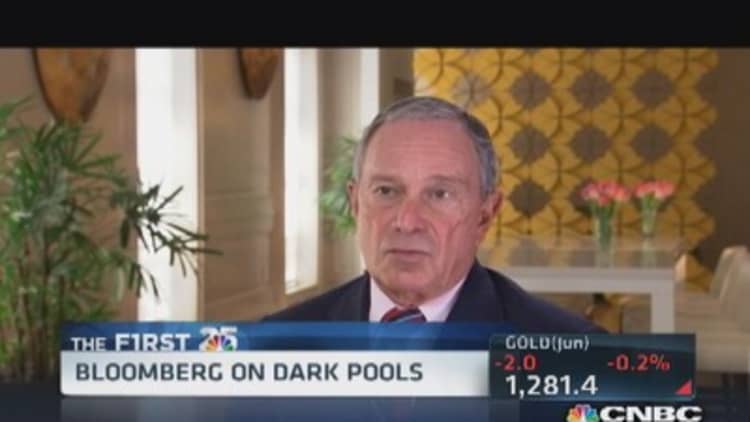
Michael Bloomberg, whose business empire brought transparency to the market, has nothing against high-frequency trading and dark pools, telling CNBC's "Squawk Box" "the system isn't rigged."
"You don't have to trade there. You as an investor don't have to tell everybody what you want to do," the former New York City mayor and majority owner of Bloomberg LP said.
"You can sit there and say, 'I'm not going to tell them that I'm going to sell my stock. If somebody comes to me with a bid maybe I'll hit and maybe I won't.' The other person doesn't have the right to know that. If you are making an offering, however, you should make it to everyone and dark pools don't work that way."
Read MoreThank you, Michael Lewis: HFT trader
He thinks the public is "better served" thanks to the number of exchanges and dark pools available that can help investors get the best price.
Bloomberg, No. 20 on CNBC's list of top 25 most influential business leaders of the past quarter century, transformed the way data was shared on Wall Street.
He launched his financial information company in 1981 with $4 million of his $10 million severance from Salomon Brothers. His idea was to supply transparent price quotes, financial data and analytics to financial services companies.
Bloomberg LP now has more than 320,000 subscribers to its terminals that supply that data. Although the terminals are at the heart of the business, over the years it has added a news service and media businesses. Bloomberg owns 88 percent of the company, which generated $8.3 billion in revenue in 2013.
Read MoreCNBC 25: Michael Bloomberg
He also served as New York City's mayor for 12 years, ending his tenure earlier this year.
Defending Wall Street
The outspoken billionaire also defended Wall Street, noting that while there have been those who have broken the law, in general "people that work on Wall Street are as good as people that work anyone place else."
"If it wasn't for Wall Street, meaning commercial banks and investment banks and everything, we would not have an economy."
He also pointed out that the average worker on the Street makes $70,000 a year, and lives and shops on Main Street.
"We're all in this together," he said.
Read MoreBillionaires reveal secrets of success
He blamed the expanding inequality between the haves and the have-nots on the effect of the Federal Reserve's stimulus program, which inflated asset values.
"The issue here is, what do you do about it," he said. History has shown that taking it from the top and giving it to the bottom "doesn't work." Instead, he thinks it's about creating equal opportunities for everyone.
Looking toward the future
Bloomberg said he never had a "Walter Mitty" moment where he thought that someday he would recreate a business empire, and he's not thinking too far down the road now either.
"I don't think back, and I don't fantasize for the future. Tomorrow is going to be the best day of my life, I know it. I've always believed that. But I don't think about the day after tomorrow."
Read MoreTitans reveal their big mistakes
—By CNBC's Michelle Fox
CORRECTION: Michael Bloomberg defended high-frequency trading and dark pools. That fact was misstated in an earlier version of this article.





